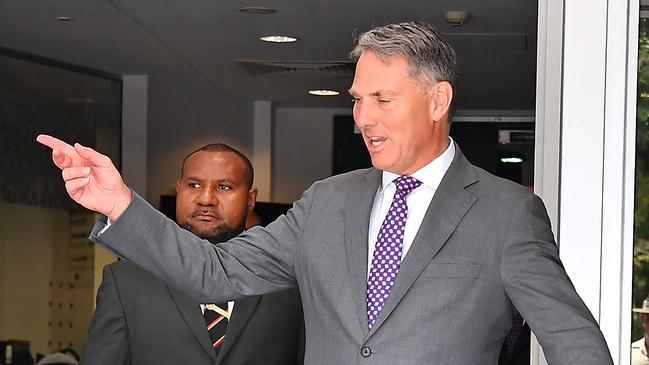Sabre-rattling strengthens PNG ties
Australia’s biggest military exercise Talisman Sabre will be hosted in cooperation with Papua New Guinea this year amid moves to bind the nations’ military forces more closely than ever.

Australia’s biggest military exercise Talisman Sabre will be hosted in co-operation with Papua New Guinea this year, amid moves to bind the nations’ military forces more closely than ever under a new bilateral defence treaty.
Defence Minister Richard Marles commenced negotiations on the treaty with his PNG counterpart Billy Joseph in Brisbane on Thursday, declaring the agreement would “enable our two defence forces to walk down a pathway of increasing integration and increasing interoperability”.
He said elements of this year’s Talisman Sabre would be staged in PNG in a “very significant step forward” for the bilateral defence relationship. “It is shaping up to be as big a Talisman Sabre as we have ever conducted,” Mr Marles said. “But this will be the first time that we are taking Talisman Sabre to Papua New Guinea, to another country.”
The exercise, which begins in mid-July, will bring together 19 nations and is expected to be closely watched by China as it has in previous years.
Dr Joseph said PNG was “tied to the hip” of Australia, even after half a century of independence.
“And it is really fitting that on the eve of the 50th anniversary of our country, we are looking at having a bilateral … security treaty with Australia,” he said.
The treaty will expand the countries’ 1977 status of forces agreement that sets the parameters for the ADF’s activities in PNG, and is expected to bolster Australian training of PNG Defence Force personnel and expand the range and size of joint exercises.
Mr Marles said the nations would move “towards a point of integration” under the treaty. “We live in a world which is increasingly strategically complex,” he said. “This is a moment where it is really important that we are working with our closest of friends, but in this case, we are working with family, and that is very much how we see our relationship with Papua New Guinea.”
The treaty negotiations follow Canberra’s green light for a $600m plan to establish a PNG NRL team, with the investment by Australian taxpayers contingent on ongoing “strategic trust” between the countries.
Australia and PNG already enjoy close defence ties, with more than 1000 personnel from both countries participating in joint training and exercises in 2024. Senior PNG personnel also serve in trusted roles in the ADF, including Colonel Boniface Aruma, the Deputy Commander of the Australian Army’s 3rd Brigade in Townsville.
The ADF also provided assistance to PNG following last year’s devastating Enga landslide.
PNG Prime Minister James Marape said at the announcement of the NRL deal in December that his country had taken a deliberate decision to make Australia its “security partner of choice”. “That doesn’t stop us from relating with any nation, especially our Asian neighbours,’ he said. “We relate with China, for instance, a great trading partner, a great bilateral partner. But in security, closer to home, we have the synergy and our shared territory needs to be protected, defended, policed.”
Under a bilateral security agreement signed last year, Australia agreed to build new police facilities, deliver a new police vessel, and support recruitment, training and forensics initiatives.
It followed unsuccessful efforts by Beijing to secure its own policing deal with Port Moresby.
Australia is also supporting the development of PNG’s critical infrastructure to ensure it doesn’t need loans from China, lending $95m through the taxpayer-funded Pacific bank to upgrade the country’s third largest port.




To join the conversation, please log in. Don't have an account? Register
Join the conversation, you are commenting as Logout